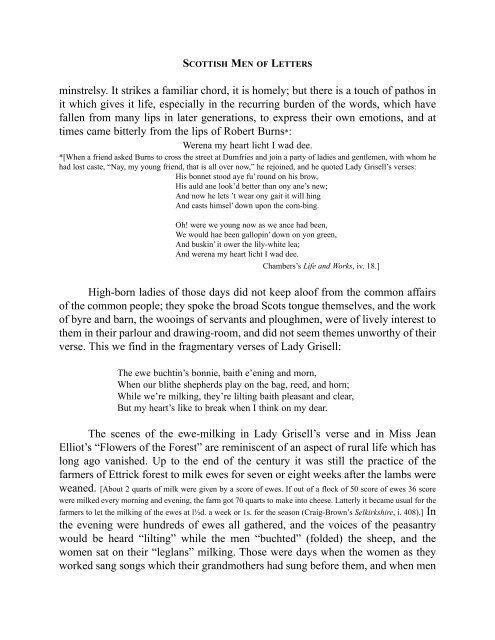CHAPTER XII WOMEN OF LETTERS IN the ... - Electric Scotland
CHAPTER XII WOMEN OF LETTERS IN the ... - Electric Scotland
CHAPTER XII WOMEN OF LETTERS IN the ... - Electric Scotland
Create successful ePaper yourself
Turn your PDF publications into a flip-book with our unique Google optimized e-Paper software.
SCOTTISH MEN <strong>OF</strong> <strong>LETTERS</strong><br />
minstrelsy. It strikes a familiar chord, it is homely; but <strong>the</strong>re is a touch of pathos in<br />
it which gives it life, especially in <strong>the</strong> recurring burden of <strong>the</strong> words, which have<br />
fallen from many lips in later generations, to express <strong>the</strong>ir own emotions, and at<br />
times came bitterly from <strong>the</strong> lips of Robert Burns*:<br />
Werena my heart licht I wad dee.<br />
*[When a friend asked Burns to cross <strong>the</strong> street at Dumfries and join a party of ladies and gentlemen, with whom he<br />
had lost caste, “Nay, my young friend, that is all over now,” he rejoined, and he quoted Lady Grisell’s verses:<br />
His bonnet stood aye fu’ round on his brow,<br />
His auld ane look’d better than ony ane’s new;<br />
And now he lets ’t wear ony gait it will hing<br />
And casts himsel’ down upon <strong>the</strong> corn-bing.<br />
Oh! were we young now as we ance had been,<br />
We would hae been gallopin’ down on yon green,<br />
And buskin’ it ower <strong>the</strong> lily-white lea;<br />
And werena my heart licht I wad dee.<br />
Chambers’s Life and Works, iv. 18.]<br />
High-born ladies of those days did not keep aloof from <strong>the</strong> common affairs<br />
of <strong>the</strong> common people; <strong>the</strong>y spoke <strong>the</strong> broad Scots tongue <strong>the</strong>mselves, and <strong>the</strong> work<br />
of byre and barn, <strong>the</strong> wooings of servants and ploughmen, were of lively interest to<br />
<strong>the</strong>m in <strong>the</strong>ir parlour and drawing-room, and did not seem <strong>the</strong>mes unworthy of <strong>the</strong>ir<br />
verse. This we find in <strong>the</strong> fragmentary verses of Lady Grisell:<br />
The ewe buchtin’s bonnie, baith e’ening and morn,<br />
When our bli<strong>the</strong> shepherds play on <strong>the</strong> bag, reed, and horn;<br />
While we’re milking, <strong>the</strong>y’re lilting baith pleasant and clear,<br />
But my heart’s like to break when I think on my dear.<br />
The scenes of <strong>the</strong> ewe-milking in Lady Grisell’s verse and in Miss Jean<br />
Elliot’s “Flowers of <strong>the</strong> Forest” are reminiscent of an aspect of rural life which has<br />
long ago vanished. Up to <strong>the</strong> end of <strong>the</strong> century it was still <strong>the</strong> practice of <strong>the</strong><br />
farmers of Ettrick forest to milk ewes for seven or eight weeks after <strong>the</strong> lambs were<br />
weaned. [About 2 quarts of milk were given by a score of ewes. If out of a flock of 50 score of ewes 36 score<br />
were milked every morning and evening, <strong>the</strong> farm got 70 quarts to make into cheese. Latterly it became usual for <strong>the</strong><br />
farmers to let <strong>the</strong> milking of <strong>the</strong> ewes at l½d. a week or 1s. for <strong>the</strong> season (Craig-Brown’s Selkirkshire, i. 408).] In<br />
<strong>the</strong> evening were hundreds of ewes all ga<strong>the</strong>red, and <strong>the</strong> voices of <strong>the</strong> peasantry<br />
would be heard “lilting” while <strong>the</strong> men “buchted” (folded) <strong>the</strong> sheep, and <strong>the</strong><br />
women sat on <strong>the</strong>ir “leglans” milking. Those were days when <strong>the</strong> women as <strong>the</strong>y<br />
worked sang songs which <strong>the</strong>ir grandmo<strong>the</strong>rs had sung before <strong>the</strong>m, and when men
















